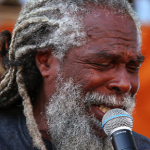Alton Ellis
The Legendary Alton Ellis: Godfather of Rocksteady
Introduction Alton Nehemiah Ellis, renowned as the “Godfather of Rocksteady,” left an indelible mark on the world of music with his soulful voice and influential contributions. Born on September 1, 1938, at Kingston Jubilee Hospital in Jamaica, Ellis rose from humble beginnings to become a pivotal figure in the evolution of Jamaican music. His journey from the vibrant streets of West Kingston to international acclaim is a testament to his talent, passion, and resilience.
Alton Ellis Early Life and Influences
Alton Ellis’s story begins in West Kingston, where he attended Ebenezer Government School. Growing up in this lively community, he was immersed in the sounds of American R&B, jazz, and gospel, which were broadcast on Jamaican radio. These genres, along with influences from artists like Ray Charles and Sam Cooke, shaped his distinctive vocal style.
Ellis’s musical journey commenced in the 1950s as a dancer, participating in local talent shows such as the Vere Johns Opportunity Knocks at the Ambassador Theatre. Although his younger sister Hortense Ellis often took first place, Alton soon discovered his true calling in singing. His first recorded song, “Muriel,” was released in 1959 with Eddie Parkins as the duo Alton & Eddie. This track became an instant hit in Jamaica, marking the beginning of Ellis’s illustrious career.
In the burgeoning Jamaican music scene of the 1960s, Ellis became a mentor to a young Dennis Brown. Dennis would later gain fame as the “Crown Prince of Reggae.” Ellis’s guidance, particularly in guitar skills and musical expertise, significantly influenced Brown’s development. This contributed to his legendary career.
The Rise of Rocksteady and Pioneering Hits
Alton Ellis emerged as a solo artist in the early 1960s, quickly becoming a leading voice in the Jamaican music industry. He is often credited with creating and popularizing the Rocksteady genre, a slower, mellower precursor to Reggae. His hits such as “Girl I’ve Got a Date” and “Cry Tough” became anthems of the Rocksteady era. These songs showcased his soulful vocals and poignant lyrics. The song “Get Ready Rocksteady” is frequently cited as the first Rocksteady track. It sparked a movement that shaped Jamaican music and culture.
Social and Political Themes
Ellis was renowned for his ability to blend love songs with social and political commentary. His work often captured the spirit and struggles of Jamaican life, addressing themes of class divides, disenfranchisement, and Black identity pride. Songs like “Dance Crasher” and “Black Man’s Pride” resonated deeply with audiences. This solidified his status as an icon.
International Career and Relocation to the UK
In the late 1960s, as Reggae emerged, Ellis relocated to the United Kingdom. The UK, with its large Jamaican diaspora, embraced Ellis and his music. This further expanded his influence. He recorded with major producers like Duke Reid and Coxsone Dodd, and later with UK-based labels such as Trojan Records. This helped to spread Rocksteady and Reggae to new audiences.
Classic Songs and Impact on Modern Music
Ellis’s extensive catalogue includes iconic songs that have left a lasting impact across various music genres. Notable hits include:
- “I’m Still in Love with You”: A classic Rocksteady track, this song was later sampled and reinterpreted by Sean Paul and Sasha in 2002, reaching No. 6 in the UK charts and No. 14 on the US Billboard Hot 100. It also inspired Althea & Donna’s “Uptown Top Ranking,” a UK chart-topper.
- “Too Late to Turn Back Now”: This Reggae rendition became popular in the UK, highlighting Ellis’s ability to blend R&B with Reggae seamlessly.
- “Breaking Up” and “Ain’t That Loving You”: These timeless Rocksteady songs showcased his soulful voice and became enduring hits, influencing artists like Bitty McLean and Amanda Reifer.
Ellis’s music has been widely sampled by artists in Reggae, Hip-Hop, and R&B, further extending his legacy. His work has appeared in films, commercials, and television shows, introducing his sound to a global audience.
Entrepreneurship and Influence in the UK
In the 1980s, Ellis opened AllTone Records in Brixton, London. This contributed to the promotion and distribution of Jamaican music in Britain. The store played a crucial role in solidifying Reggae’s foothold in the UK. Ellis also hosted the annual Easter Reggae shows called Rocksteady Gala, celebrating the genres he helped pioneer.
Alton Ellis Awards and Recognition
Throughout his career, Alton Ellis received numerous accolades. In 2004, the Jamaican Government awarded him the Order of Distinction for his contributions to music and culture. In 2006, he was inducted into the International Reggae and World Music Awards (IRAWMA) Hall of Fame. In 2017, he was honored posthumously at the Jamaica Reggae Industry Association Honour Awards.
Alton Ellis Final Years and Passing
Despite battling illness, Ellis continued to perform and tour in his later years. He passed away on October 11, 2008, in London, marking the end of a remarkable era in Jamaican music. However, his legacy endures, touching countless fans and artists around the world.
Legacy and Modern Tributes
Alton Ellis’s music remains foundational to Reggae and Jamaican music. His songs are frequently sampled and covered by contemporary artists, ensuring his legacy lives on. As a pioneer and innovator, Ellis’s influence on Jamaican music is celebrated by both his family and the broader music community. He continues inspiring musicians and music lovers worldwide.











